Facebook
Twitter
LinkedIn
Pinterest
Reddit
Email
Print
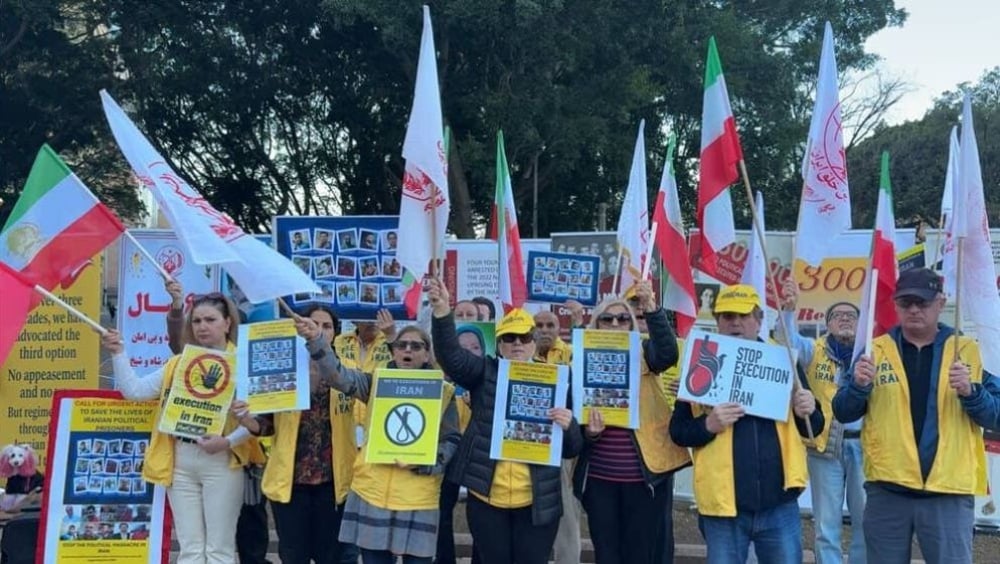 Sydney Rally Demands Action to Stop Executions of Iranian Political Prisoners
Sydney Rally Demands Action to Stop Executions of Iranian Political Prisoners
THIS PAGE WILL BE UPDATED WITH THE LATEST NEWS
UPDATE: 8:00 AM CEST
Iran’s regime escalates war on political prisoners with attempted exile of Saeed Masouri

In a transparent act of retaliation, the Iranian regime has ordered the forced exile of Saeed Masouri, one of Iran’s longest-serving political prisoners, to the notoriously brutal Zahedan prison. The decision, announced on Saturday, July 19, by authorities in Ghezel Hesar prison, comes just three days after a failed attempt by security forces to abduct him was met with fierce resistance from his fellow inmates.
This is not a routine prison transfer. It is a calculated escalation in the regime’s war against organized dissent and a desperate attempt to break a symbol of unwavering defiance. Masouri, a supporter of the People’s Mojahedin Organization of Iran (PMOI/MEK), has been imprisoned for 25 years without a single day of furlough. His exile is the latest proof that as popular unrest grows, the clerical regime is intensifying its reign of terror inside its dungeons, targeting the very prisoners who inspire the nation’s resistance.
Iran protests weekly: Citizens confront regime’s systemic corruption and failure across the country
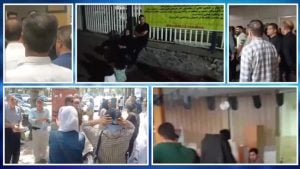
In a powerful continuation of nationwide resistance, the past week has seen a surge in protests across Iran, as citizens from all walks of life took to the streets to challenge the clerical regime’s deep-rooted corruption, incompetence, and destructive policies. From Tehran’s hardworking bakers to defrauded housing applicants in Arak and Birjand, and resilient retirees in Rasht, the Iranian people have once again demonstrated their unwavering resolve to achieve freedom and justice.
This weekly roundup of protests, covering events from July 11-14, highlights a populace pushed to the brink by a regime that plunders their wealth and obstructs their progress. The unified message from the streets is one of total rejection of the ruling dictatorship.
Fariba Ahmadi Dies After Raid Targeting Political Prisoner’s Family
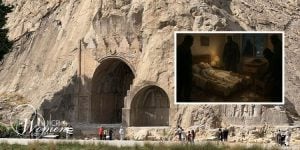
Fariba Ahmadi, the ailing and elderly stepmother of political prisoner Pejman Tobreh-Rizi, died of a heart attack following a violent nighttime raid by Iranian security forces on her home in Kermanshah.
The raid occurred on the night of Monday, July 14, 2025, targeting the home of Pejman Tobreh-Rizi’s family. According to eyewitnesses, agents stormed the residence in an aggressive and intimidating manner, disregarding the medical conditions of its elderly occupants. Fariba Ahmadi, who was bedridden due to cancer, reportedly suffered a fatal heart attack amid the chaos and terror caused by the operation.
Sydney Rally Demands Action to Stop Executions of Iranian Political Prisoners
Sydney, Australia – July 19, 2025 – Supporters of the People’s Mojahedin Organization of Iran (PMOI/MEK) gathered in Sydney to protest the Iranian regime’s ongoing human rights abuses, particularly its use of systematic torture and the death penalty against political prisoners. The rally focused on the urgent situation of prisoners of conscience who face imminent execution for supporting the PMOI.
Stockholm Rally Demands Action to Stop Executions of Iranian Political Prisoners
Stockholm, Sweden – July 19, 2025 – Supporters of the People’s Mojahedin Organization of Iran (PMOI/MEK) gathered in Stockholm to protest the Iranian regime’s ongoing human rights abuses, particularly its use of systematic torture and the death penalty against political prisoners. The rally focused on the urgent situation of prisoners of conscience who face imminent execution for supporting the PMOI.
Supporters of the Iranian Resistance Hold Awareness Event on Utøya Against Executions in Iran

On July 17, 2025, members of the Young Norwegian-Iranians for Democracy (UNID)—supporters of the Iranian Resistance—held an awareness event on the island of Utøya, Norway. The event aimed to highlight the Iranian regime’s escalating use of executions and brutal repression to silence dissent. Organized with the support of Socialist Youth (Sosialistisk Ungdom), the event featured an information stand and a photo exhibition to raise public awareness among Norwegians.
Judiciary Under the Microscope of Justice – Part 6

In the Legal System of the Mullahs’ Regime, “Judiciary” Means Obedience, Not Justice. In the legal structure of the ruling regime in Iran, what is referred to as “judiciary” is not founded on justice, impartiality, or human rights, but rather on vengeance and absolute obedience to the Supreme Leader.
In this system, the judge is not the guarantor of justice but the arm of the regime’s oppression. Defendants are deprived of even the most basic rights, and the entire judiciary is designed in reverse:
“Trial” becomes a spectacle of forced confessions
“Court” becomes a room for implementing pre-issued sentences
The “judge” becomes a cog in the machinery of death and torture
Iran Moves Forward with Segmented Internet Access Plan
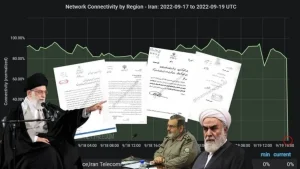
On Tuesday, July 16, 2025, the Supreme Council of Cyberspace, chaired by Masoud Pezeshkian, approved the plan for a Class-Based and national internet. The infrastructure for this plan had begun during the presidency of Hassan Rouhani and under the Ministry of Mohammad-Javad Azari Jahromi.
During his election campaign, Pezeshkian had promised “a free and global internet for all” and pledged to lift filtering restrictions. These promises had attracted some supporters. However, with the approval of this plan, those promises will not be fulfilled. The plan introduces new restrictions on internet access.
Severe Water Crisis Sweeps Across Various Iranian Cities
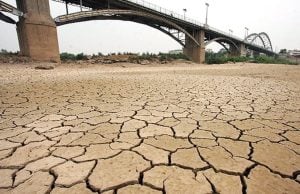
As Iran enters its fifth consecutive year of drought, the water crisis has intensified on a broad scale. From rural areas and underprivileged towns to the capital Tehran, communities are experiencing water shortages, pressure drops, and even frequent water outages.
Sajjad Jafarzadeh, the director of water and wastewater in Khalkhal, confirmed on Friday, July 18, that the region is facing severe water stress and part of the water supply project remains unfinished due to lack of funding.
Iran’s Soaring Prices: The Regime’s Economic Neglect Fuels Widespread Poverty
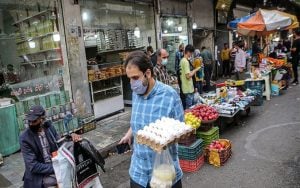
As inflation continues its relentless climb in Iran, the regime’s refusal to intervene in market regulation has intensified the economic burden on millions. From essential goods like bread and meat to fuel and medicine, prices are spiraling beyond reach, shrinking household incomes and expanding the circle of poverty across the country.
Despite its fundamental duty to secure citizens’ access to basic necessities, the Iranian government under President Masoud Pezeshkian has failed to act decisively. The rising cost of living is not a short-term crisis but a persistent wound that has been deepening for decades. The regime’s use of external conflict, including the recent 12-day war, as justification for internal economic failures has only worsened public resentment.
Radan’s Remarks Reveal Iran Regime’s Panic and Fear of Uprising
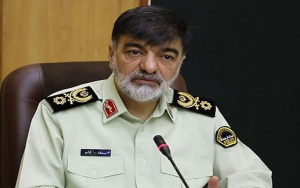
In a revealing interview with the state-run SNN News Agency on July 15, 2025, Brigadier General Ahmad-Reza Radan, commander of Iran regime’s Law Enforcement Forces and one of the most notorious enforcers of Supreme Leader Ali Khamenei’s oppressive apparatus, unleashed a barrage of threats, deflections, and insults directed at the Iranian people. Far from projecting strength, Radan’s words laid bare the regime’s deepening fear and fragility in the face of growing public unrest.
Recycling a tired narrative, Radan claimed that “spies and traitors are under surveillance, and the remaining ones will soon be eliminated.” This statement, seen by many as a desperate diversion, attempts to shift public attention away from the regime’s endemic corruption and dysfunction. Mounting evidence suggests that the recent leaks of sensitive information — including from senior ranks within the Revolutionary Guards and the Ministry of Intelligence — stem not from foreign sabotage but from insiders disillusioned with the system.
Regime Voices Fear of Organized Resistance: Cracks Widen in Iran’s Power Structure
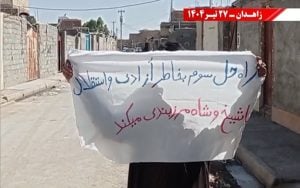
As Iran’s theocratic regime grapples with one of the most severe crises in its history—spanning economic, political, and social dimensions—its senior figures are making rare admissions that reveal a mounting fear of collapse. Recent statements by Mohammad-Taqi Taqavi, former head of the Policy Council for Friday Prayer Leaders, and Supreme Leader Ali Khamenei himself, suggest that Tehran’s ruling elite increasingly views the threat of overthrow not as a foreign plot, but as the result of an internal, organized resistance.
On July 18, Taqavi openly stated: “They calculated that by attacking the regime’s personalities, the system would weaken, and then the infiltrating cells of the [MEK] and thugs would take over the scene, and eventually the discontented people would bring down the regime.”
The Third Option on the Table: A Democratic Solution for Iran’s Crisis After the 12-Day War
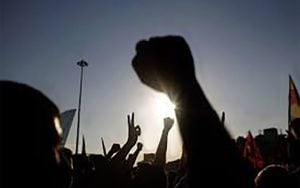
In the wake of the 12-day war between Israel and Iran’s ruling theocratic regime, the political fallout has spread far beyond the battlefield. Although the conflict concluded with a fragile ceasefire, its deeper reverberations are now being felt within Iran itself. Among those who welcomed the cessation of hostilities was the Iranian Resistance, which has consistently advocated a clear and principled political solution: “No to war, no to appeasement—yes to the Iranian people’s uprising for regime change.”
This position, often referred to as “the third option,” contrasts starkly with the regime’s narrative and centers not on external military solutions or conciliatory diplomacy, but on empowering Iran’s own citizens to determine their future.
Also, read Iran News in Brief – July 20, 2025